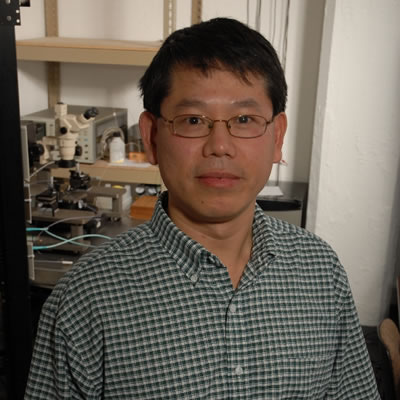About
Dr. Pingshan Wang obtained his PhD degree from Cornell University, Ithaca, NY, in Electrical and Computer Engineering(ECE)in 2004. Currently, he is a professor at ECE Department, Clemson University, where he has been a faculty member since 2006.Dr. Wang and his group focus on developing microwave lab-on-chip (μ-LOC) techniques and investigating radio frequency (RF) bio-effects for biomedical applications. Supported by various funding agencies, including NSF, NIH, US Army, AirForce and Bill & Melinda Gates Foundation, they invented and demonstrated a few novel μ-LOC techniques (e.g. tunable RF interferometers, US patent9, 464, 994 B2) for highly sensitive and broadband detection of single biological cells, membrane domains, nanoparticles, DNA molecules and volatile organic compounds(VOCs).Their RF techniques enabled record measurement resolutions and limit-of-detection(LOD). In their proof-of-concept studies, they also demonstrated RF differentiation of cell species, cell strains, cell viability, membrane domains, DNA molecules and VOCs without using bio-recognition or chemical recognition elements and reporters. Their recent invention, an automatic and reference-free calibration technique (US patent application 16575439), enables accurate, quantitative, and reliable RF sensing when environmental factors change (e.g. temperature and pH). Their RF sensing techniques, which are fully compatible with disinfection procedures, are easy-to-use and promising for cost-effective health care applications.
Visit Dr. Wang's Faculty Profile
How their research is transforming health care
Radio frequency (RF) is the last frequency domain that has not been explored for biomedical applications. Dr. Wang and his group develop novel radio frequency (RF) spectroscopic detection techniques for multiplex sensing of pathogenic microorganisms without using biochemical recognition or reporting elements. The RF techniques measure the molecular quantity and composition profile of single cells. Then, RF features of cell species, strain and viability are extracted through machine learning. Pathogen models are established and trained for automatic cell identification. Compared with other culture-independent pathogen detection methods, sample preparation for RF detection is significantly simplified since bioreceptors and reporters are not used and many sample matrix interfering factors, such as PCR inhibitors, are not important. RF sensing is also non-invasive and preserves sample integrity for further examination when necessary.
Additionally, the scalable RF techniques can be arrayed for high-throughput, online and near real-time sensing. A networked and cloud-based pathogen analysis scheme further transform RF rapid diagnostics in medical service, especially for cost-effective point-of-care setup. Through a collaborative health research agenda with Clemson health partners, we look forward to developing our portable RF detection platforms for rapid diagnostics of specific diseases such as systemic Candida infection and sepsis as well as rapid antifungal/antimicrobial susceptibility testing (AST). Immediate efforts include characterizing common yeasts and bacteria inpatient blood or other body fluids, extracting their RF features and train pathogen models for automatic identification of pathogen species, strain and viability, developing automated sample preparation techniques and arrayed RF detection platforms, establishing a database of pathogen RF features and models, and demonstrating multiplex pathogen detection with clinical samples.
Health Research Expertise Keywords
Faculty Scholar, Systemic Candida infections, Sepsis, Rapid detection of Candida infection, Rapid sepsis diagnosis, Antifungal susceptibiity testing, Antimicrobial susceptibility testing

